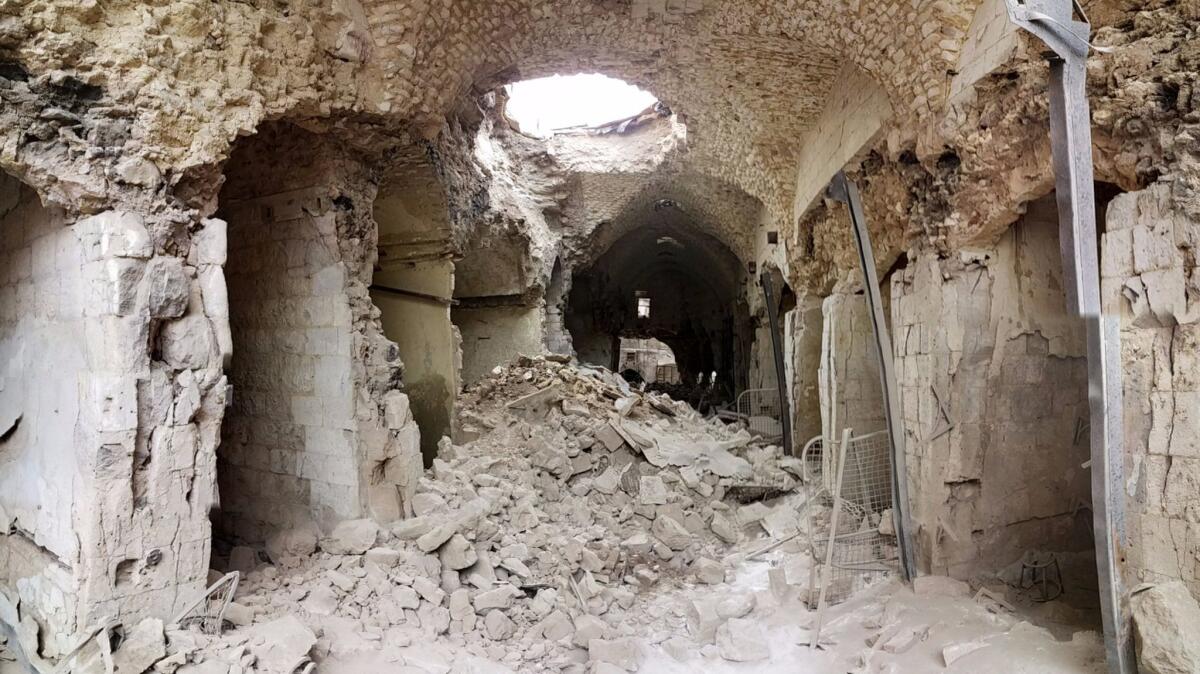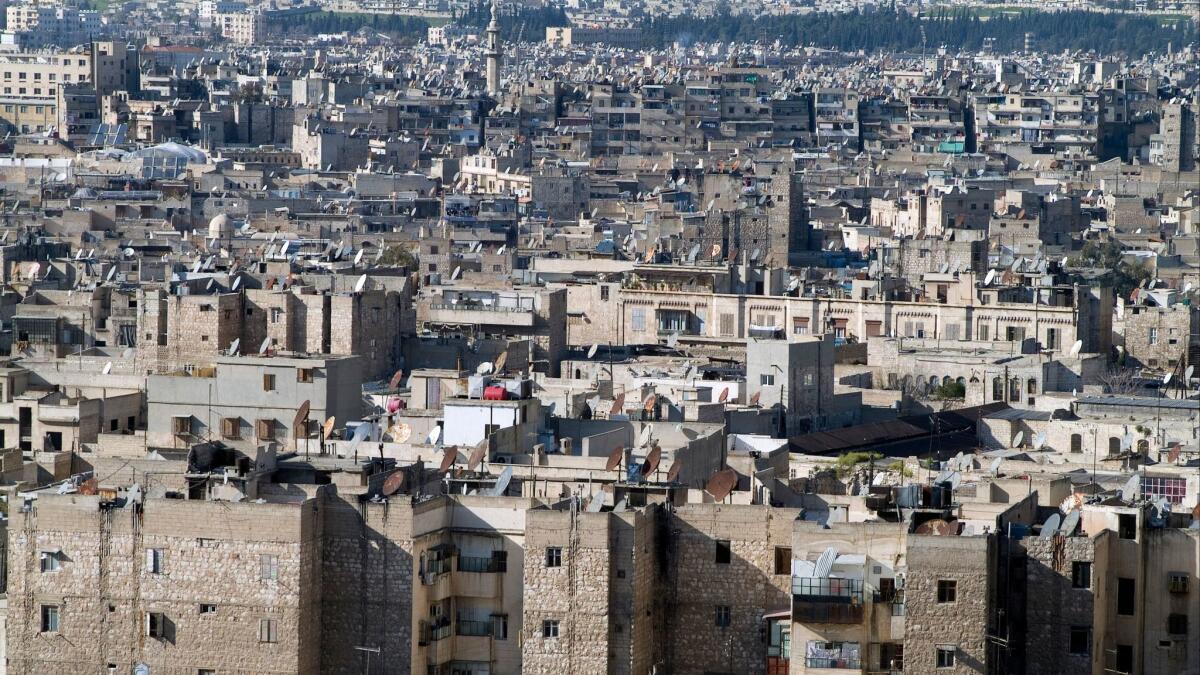It was ‘one of the most beautiful cities in the world.’ That Aleppo is gone, but its residents remember
Reporting from Aleppo, Syria — Aleppo al Shabaa, Aleppo the White. That was the nickname its people bestowed upon it, a nod to the brightness of the marble used in the buildings of this once proud metropolis.
For at least 5,000 years, it has been a jewel in the crown of empires, a place that drew poets and polymaths, industrialists and artisans. A major terminus on the Silk Road, it was once viewed as second only to Constantinople in prominence.
But when Ziad Oubari remembers the city — the one that existed before Syria’s civil war — he doesn’t remember only the grand buildings or the proud history of one of the oldest continuously inhabited cities on Earth. He remembers the Souk al Attareen, the perfumers’ market, where he would stroll through the arched stalls whenever he felt annoyed or exasperated, inhaling the melange of scents.
“They’re always in my nostrils,” said Oubari, a pharmaceutical goods manufacturer who is still in business in Aleppo.
And when Nour Kabbach, an aid worker from Aleppo now living in Istanbul, casts her mind back, she thinks of the city’s famed 13th century Citadel, rising majestically above the Old City, but also of Qahwet al Qalaa, a working-class coffee shop at the foot of the fortress, where she and her friends would go after a day of shopping for soup or Aleppo specialties like dibs fleifleh, a sort of pepper paste.
“It was the best one: right at the door, so you would have a full view of the citadel. Nothing is obstructing it,” Kabbach said. It wasn’t a very fancy place, she said. Still, “Aleppans preferred to go there and not to the five-star hotel that was serving cocktails nearby.”
After five years of war between forces loyal to Syrian President Bashar Assad and the fractious opposition seeking his overthrow, their Aleppo is a city that in many ways no longer exists.
In December, the battle came to an apparent close after the rebels agreed to abandon their enclave in eastern Aleppo. The government, which had maintained control of western Aleppo, now controls the entire city.
It is a city shattered, its magnificent stone structures unable to withstand the weapons of modern warfare. Thousands of Aleppans, especially the city’s Armenian Christian minority, are scattered as refugees across the globe.
The porticoes of the Great Mosque are singed black and pitted with sharp white tears in the rock. A shell has punched open a new skylight in an ancient structure. Wrecks of vehicles cannibalized for parts stand as sorry sentinels on tiled roads once alive with vendors and restaurants.

Still, the ghost of the vanished Aleppo endures, along with the pride (some might say arrogance) of those who once lived and thrived as part of the city’s merchant and industrialist class. They sound a lot like the New Yorkers who say: “If you can make it here, you can make it anywhere.”
Just listen to Hagop Haddad, a furniture maker in the Midan district: “In the past, he who could make it in Aleppo would prove his worth across other major cities on the Silk Road. Companies would have their administrative places elsewhere, but their factories stayed in Aleppo because the workers were better.”
“It is enough for me to be an Aleppan to be special,” he said.
An undercurrent to this strong sense of belonging was an insular bent among Aleppans, almost a shunning of those who came from other parts of Syria, even Damascus, the capital.
“Our identity was Aleppo, and we were unique in Syria,” said Rashed Tabshi, a former interior designer from the Aziziyeh neighborhood now living in the southern Turkish border town of Gaziantep.
“Aleppo, its accent was special. Its food was special. Even the way we look is different. And there was always political competition between us and Damascus. It’s the political capital, but Aleppo was the economic as well as the Francophone capital of Syria.”

Kabbach, the aid worker living in Istanbul, agreed.
“In Damascus, you would hear different accents, but Aleppo wasn’t a cosmopolitan city, and when they asked us, we would say we’re from Aleppo, not from Syria. Sometimes you wouldn’t have to even ask because of the heavy accent of the ‘hello,’” she said in a phone interview.
That’s why, even among Syrian communities in Turkey and elsewhere, Aleppans formed their own clique. “We had our own food, our own music, our own rhythm,” she said.
And unlike in Damascus, the “powerful people in Aleppo were the industrialists.”
One such businessman and now parliamentarian for Aleppo, Fares Shehabi, remembered his time in Club d’Alep, an exclusive, members-only club opened in 1945 that hosted bridge games, among other activities. There, he said, amid cream-colored walls and elegant, decorated tiles, he spent some of the happiest moments of his childhood.
He rattled off the names of other areas in the Old City, like the Carlton and the Zamarya hotels — all destroyed in the war.
“In 2011, Aleppo was one of the most beautiful cities in the world and we never thought of leaving it,” he said.
Aleppo really came alive at night, residents recalled. Kabbach, for example, preferred the nightlife there to the fabled clubs of Beirut, where she went to university. In Aleppo, “Even our weddings were special. They would kick off at 12 midnight and end in the morning,” she said.
Tabshi and others now fear for the future of the ancient sites. They point to the souks in nearby Beirut, which were razed and rebuilt after being damaged in Lebanon’s 15-year civil war. Their reconstruction is considered by many to be a primer on how not to restore war-devastated areas.
“Whenever I see pictures of the old city, I start crying. It burned my heart. If I see a picture of my deceased father I wouldn’t cry like this,” said Tabshi.
“And it won’t come back…. It’s a crime by both sides that it’s gone.”
Bulos is a special correspondent
ALSO
Meet the culinary zealot fighting to preserve Syrian cuisine despite years of war
A bittersweet Aleppo story: ‘Sir, do you know where I can find my mother?’
More to Read
Sign up for Essential California
The most important California stories and recommendations in your inbox every morning.
You may occasionally receive promotional content from the Los Angeles Times.











